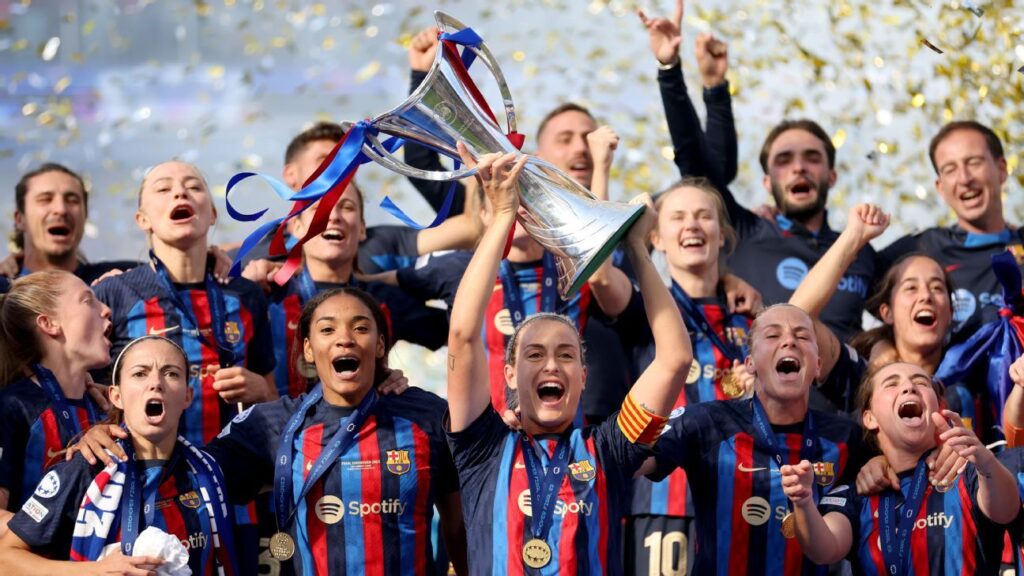In their fourth Champions League final in five years, Barcelona used their experience to write a new chapter in their history, leaning on the lessons of the past to banish any final demons and come from two goals down to beat VfL Wolfsburg 3-2 on Saturday. It was a win that started with a loss five years previous, though.
Humbling. That’s the easiest way of describing Barcelona’s first Champions League final, the relatively inexperienced team had done well to reach Europe’s showpiece event in 2019, but when it came to facing the unrelenting might of Lyon, the Catalans looked little more than the proverbial girls struggling against the full strength of their French elders.
It was a loss that stung those involved deeply. However, it provided a priceless learning experience for Barca, and when they took to the pitch for their second Champions League final — against Chelsea — in 2021, the Spanish champions had graduated from girls to women, and it was they who handed out the humbling in Goteborg.
Their next appearance in a final, the next year, saw them given the favourites tag, the team from Catalonia regarded as the dominant, awe-inspiring team on the continent. There was a perception that they had already dethroned eight-time winners Lyon before stepping onto the pitch in Turin.
Yet the final last year aligned much more with that first fateful meeting on that balmy Budapest evening when the Blaugrana were carved apart by OL, offering as much resistance as a perfectly cooked piece of brisket. And in northern Italy, Barcelona were nullified by a pragmatic Lyon who attacked with ruthless efficiency.
Maybe that was the theme for Barcelona: a win could only be preceded by a loss. Or maybe it was the learning curve that came with the punishing 90-minute stretches against Lyon that forced the Spanish champions to face their own frailties.
In Eindhoven, the narrative was once again that Barca were the favourites even if there were questions around how they would match Wolfsburg’s physicality. When the ball started to roll in the Netherlands, it was Barcelona who were in the expected ascendancy — that was, until Ewa Pajor stole the ball from Lucy Bronze in the fourth minute. The Poland striker set herself before thundering a strike into the top corner that could only bruise Sandra Paños’ fingertips on the way through.
Although the pain of final losses was fresher for Barcelona, it was a feeling Wolfsburg were all too familiar with. The She Wolves have lost three finals since their last triumph in 2014.
A goal to the good, Wolfsburg fell into a tight shape off the ball to deny Barcelona the space they so craved to work in. Unable to whittle space in the box, déjà vu threatened to settle in for a Barca side who all too quickly saw visions of the 2019 and 2022 finals that got away from them. The side that have become known for their composure and ease on the ball began to panic, nervously snapping shots at goal as soon as they were within range.
In Budapest, and indeed Turin, the match was already lost by half-time, so when Alexandra Popp nodded the ball over the line late in the first half, Barcelona could have felt the trophy slipping through their fingers once again. Yet, it was those losses to Lyon that the Blaugrana have learned and grown from, as Caroline Graham Hansen said to DAZN after the game, “At half-time, 2-0 down, I had a big flashback from the last final, and it was like, it’s not going to happen again.”
There is no substitute for experience, even if that experience soaks your T-shirt with bitter tears and leaves you tossing and turning all night, plagued with what-ifs and an endless show reel of near misses. It was that experience that was vital in Eindhoven; it was the introspection that allowed Barcelona to see the 16 shots they’d taken to Wolfsburg’s three and find the resolve to keep going with the belief in the Barca way.
Not quite the player moulded in the pure Barcelona blueprint, having spent the first 17 years of her life 200 kilometres across the Balearic Sea in Palma de Mallorca rather than an idiosyncratic Catalonian suburb like La Masia graduates Aitana Bonmati (Vilanova i la Geltrú), Alexia Putellas (Mollet del Vallès) or Claudia Pina (Montcada i Reixac), Patri Guijarro had always been a player fluent in the teachings and principles of Barça.
Usually the player to sit in the midfield pivot, mopping up mounting danger while playing neat little passes to help her team build their own attack from their celebrated midfield, Patri’s understanding of how midfield compatriots Alexia and Aitana want to play has stood her team in good stead over the years. Yet, in the afternoon sunshine in Eindhoven, it was Patri who was making a dash to the heart of the box less than three minutes into the second half to receive Graham Hansen’s cutback and divert it goalwards. It was the midfield maestro who, after scoring Barcelona’s first of the final, found an equaliser just 168 seconds later, not just giving the Catalans a lifeline in the final but resurrecting a side that looked ready to be buried when they trudged in at the break.
It was that Barcelona DNA that pulsates outwards from the midfield epicentre that allowed the team to find spaces to play in and exploit from the very start of the second half; it was the style the team preached that allowed Patri to get forward and make the most of Graham Hansen and Aitana’s pinpoint delivery. The final, as it began to drift from Wolfsburg, became the perfect example of the intoxicating football nous of the Spanish champions and the crucial mentality to overcome the biggest of hurdles and toughest of opponents. It was the understanding of how to stand on the biggest stages and not be overawed, regardless of location or opposition, and it was the mentality that Lyon had mastered that Barcelona had learned from.
When the third goal came for Barcelona, there was no surprise, no shock to the system that either of Patri’s goals carried; instead it was imminency; an expected strike and reliable as it nestled against the back of the net. Although it was a scramble of a mess that started with Lynn Wilms kicking the ball directly into Kathrin Hendrich’s face, it ended in the most predictable of fashions, with those in blue and scarlet wheeling away in celebration.
Ahead for the first time in 160 minutes of final action, Barcelona had to just wait out the clock, letting it tick down to their victory as Wolfsburg began to panic and lose their own composure. For the team that had won their last European title by overcoming a 3-2 deficit to Tyresö in 2014, the dread began to set in as it had for Barca in the first half, their season riddled with narrow escapes, the reality of a title thrown away began to take hold for the She Wolves.
For two teams who had both tasted misery on the biggest European stage multiple times, there was only ever going to be joy for one, but with defeat snatched from the jaws of victory, the pill was sour and unexpected, hard to swallow for Wolfsburg. For Barcelona and the players who lined up against Lyon last year, as well as those who were present for their first final outing in 2019, the victory that never could have been possible had it not been for their past failures made this all the sweeter. The new chapter in their history is turning the page on women’s football in Europe, promising a new story and a new dynasty.




